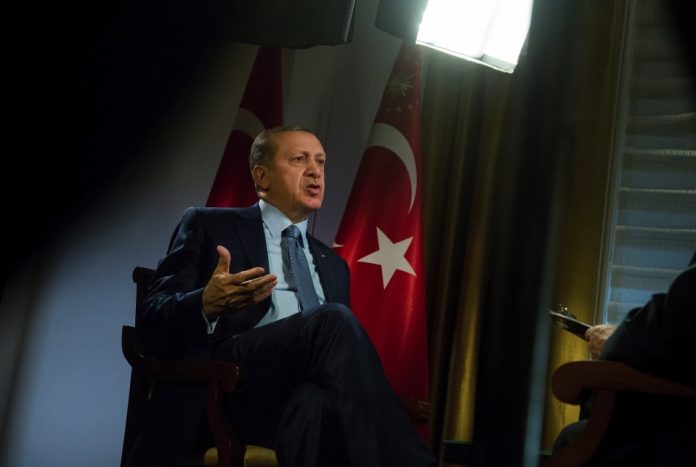
President Recep Tayyip Erdogan accused the U.S. of failing to live up to its obligations on two issues of vital importance to Turkey by backing Kurdish fighters it considers terrorists and harboring an aging cleric it accuses of fomenting a failed coup.
By giving military support to Kurdish fighters battling the Islamic State across Turkey’s border in Syria, America is “doing wrong before the eyes of the world,” Erdogan said Thursday in an interview in New York. An international coalition should do that job without relying on the Kurds, he argued. “By giving them weapons, you’re endangering our future.”
Erdogan also dismissed U.S. arguments that an extradition request for Fethullah Gulen, a Turkish preacher living in rural Pennsylvania, must first work its way through the judicial system. The Department of Justice is reviewing Turkey’s evidence of Gulen’s alleged involvement in the failed July coup. U.S. officials say a decision on Gulen, who has rejected the accusations against him, may need months of consideration.
“I’m sorry, I can’t wait for the verdict to be issued by a court because this offense has not been committed in the U.S. — it has been committed in Turkey,” said Erdogan, who was once allied with Gulen. Of the U.S. role, he said: “We want our political partner to be a trustworthy partner. And we want our political partner to rise to the occasion and meet our expectations.”
Erdogan’s remarks underscored the growing strain between the two NATO allies. The Turkish leader’s vast purge of his country’s military, judiciary, educational and business sectors in the wake of the coup has raised concerns among human rights groups and some governments that he is going too far. Yet in the fight against Islamic State the U.S. also depends greatly on Turkey, which allows American planes to conduct an air campaign from its Incirlik air base.
President Barack Obama has wrestled with how to balance those competing priorities. In a visit to Ankara in 2009, he called the relationship a “model partnership.” But he subsequently distanced himself from Erdogan, warning that his policies risked sending Turkey down a “troubling” path.
In August, Vice President Joe Biden returned to Ankara and said U.S. support for Turkey was “absolute” and “unwavering.” He also tried to explain the U.S. legal processes that have to be carried out for an extradition to take place.
The U.S. said Turkey’s first extradition request following the coup had no evidence connected to the failed putsch, and the country has since submitted new documents. In the interview with Bloomberg, Erdogan expressed renewed frustration, saying Turkey had answered U.S. requests to extradite terrorists in the past.
“We are strategic partners with you., we’re together with you in NATO,” he said. “We want him. Give him to us. We will prosecute him and we will do whatever is necessary.”
The Syria conflict has been another source of tension. Erdogan sent Turkish troops into Syria last month, ostensibly to combat the Islamic State, but also to check the influence of Syrian Kurds who had been advancing along the border with U.S. support. Turkey says the militias are linked to violent separatist groups inside its own borders.
And the Turkish president has moved to improve ties with Russia — an ally of the Syrian regime opposed by the U.S. — after the Turkish military shot down a Russian jet late last year.
Even as Turkish troops advance in Syria, the U.S. has continued to support the Kurds because it sees them as the most lethal fighting force against Islamic State.
Gen. Joseph Dunford, chairman of the U.S. Joint Chiefs of Staff, told a Senate committee in Washington on Thursday that providing more arms to the Syrian Democratic Forces, an alliance that includes Kurdish fighters, “will increase the prospects of our success” in retaking Raqqa, Islamic State’s stronghold in Syria.
“They are our most effective partner on the ground,” Dunford said.
That didn’t sit well with Erdogan, who accused the U.S. of hypocrisy.
“You cannot use one terrorist organization to destroy another terrorist organization — this is a big mistake,” Erdogan said. “This is not good for Turkey because we are suffering at the hands of the terrorist organization that you seem to be defending.”
Despite his clear frustration with current U.S. policy, he declined to weigh in on the upcoming presidential election. He said he’ll wait and see who he’ll be working with after the vote, but also offered reassurances about the long-term prospect for ties with the U.S.
“We will, of course, sustain our endeavors with the United States,” Erdogan said. “It’s out of the question for us to get detached from the U.S.”
Featured Image: Bloomberg photo
(c) 2016, Bloomberg · John Micklethwait, Nick Wadhams

